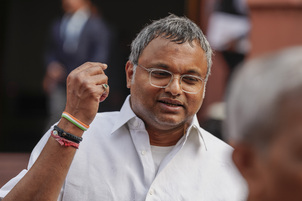New Delhi: A setback to Delhi Chief Minister Arvind Kejriwal as the Supreme Court on Monday declined to provide interim relief in his plea challenging his arrest and detention in the Delhi Excise Policy scam case.
The two-judge bench, headed by Justice Sanjiv Khanna and Justice Dipankar Datta, refrained from issuing any orders on Monday, opting instead to issue a notice to the Enforcement Directorate (ED), the investigative agency handling the case. They instructed the ED to respond by April 24 and scheduled further proceedings for the week starting April 29.
Arvind Kejriwal’s senior counsel, Abhishek Manu Singhvi, argued fervently for relief, contending that Kejriwal’s name wasn’t mentioned in the chargesheet for the Delhi Excise Policy scam and that his arrest was unjust. Singhvi asserted that the timing of Kejriwal’s arrest was aimed at impeding his participation in the 2024 Lok Sabha elections.
Despite these arguments, the bench refrained from issuing any orders and instead directed the ED to respond by April 24, with Kejriwal’s rejoinder due by April 27. This decision came after the Delhi High Court dismissed Kejriwal’s plea on April 9, prompting him to approach the Supreme Court on April 10.
Kejriwal’s arrest on March 21 and subsequent remand to ED custody sparked legal battles. Initially granted six days of custody, it was extended by four days. On April 1, he was remanded to judicial custody until April 15. Throughout, Kejriwal has maintained his innocence, alleging that his arrest was timed to discredit him and his party.
The Additional Solicitor General representing the ED argued that substantial evidence implicates Kejriwal as the central figure in the liquor scam. The Delhi High Court concurred, stating that Kejriwal’s arrest was lawful and that he played pivotal roles both as an individual and as the national convenor of AAP in the formulation of the excise policy, allegedly involving kickbacks.
The court emphasized the applicability of Section 70 of the Prevention of Money Laundering Act, which holds individuals accountable for corporate contraventions. Thus, while the legal battle continues, the Supreme Court’s decision to withhold interim relief prolongs the uncertainty surrounding Kejriwal’s legal predicament.






